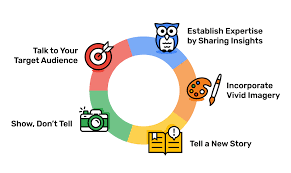The Power of Targeted Marketing Campaigns
The Power of Targeted Marketing Campaigns
In today’s competitive business landscape, reaching the right audience with your marketing message is crucial for success. Targeted marketing campaigns have emerged as a powerful strategy to engage with potential customers in a more personalized and effective way.
Targeted marketing involves tailoring your promotional efforts to specific segments of your audience based on demographics, interests, behaviour, or other factors. By focusing on a particular group of individuals who are more likely to be interested in your products or services, you can increase the relevance and impact of your marketing efforts.
One key benefit of targeted marketing campaigns is the ability to deliver highly relevant content to your audience. By understanding the needs and preferences of different customer segments, you can create messages that resonate with their interests and address their pain points. This personalised approach not only increases engagement but also enhances brand loyalty and drives conversions.
Moreover, targeted marketing allows you to optimise your resources by directing your budget towards the most promising prospects. Instead of casting a wide net and hoping for the best, you can focus your efforts on segments that are more likely to respond positively to your message. This results in higher ROI and better overall campaign performance.
Another advantage of targeted marketing campaigns is the ability to track and measure results more effectively. By segmenting your audience and tailoring your messages accordingly, you can gain valuable insights into which strategies are working and which need adjustment. This data-driven approach enables you to refine your campaigns in real-time and improve their effectiveness over time.
In conclusion, targeted marketing campaigns offer businesses a powerful tool to connect with their audience on a deeper level and drive meaningful engagement. By understanding the unique needs and preferences of different customer segments, companies can create more relevant and impactful marketing messages that resonate with their target market. Embracing targeted marketing strategies can lead to increased brand awareness, customer loyalty, and ultimately, business growth.
Maximising Impact: 8 Key Benefits of Targeted Marketing Campaigns
- Increased relevance of marketing messages
- Enhanced engagement with target audience
- Improved brand loyalty and customer satisfaction
- Higher conversion rates and sales
- Optimised use of marketing budget and resources
- Better understanding of customer needs and preferences
- Real-time tracking and measurement of campaign performance
- Ability to adapt and refine strategies based on data insights
Six Drawbacks of Targeted Marketing Campaigns: Privacy Issues, Customer Alienation, and Operational Challenges
- May lead to privacy concerns if customers feel their personal data is being used without consent
- Risk of alienating potential customers who do not appreciate targeted advertising
- Complexity in managing multiple segments and tailoring messages for each group
- Potential for inaccuracies in targeting criteria, leading to ineffective campaigns
- Increased costs associated with data collection, analysis, and segmentation
- Difficulty in predicting changing consumer preferences and behaviours accurately
Increased relevance of marketing messages
One significant advantage of targeted marketing campaigns is the increased relevance of marketing messages to specific audience segments. By tailoring content to match the interests, preferences, and behaviours of different customer groups, businesses can deliver highly personalised messages that resonate with their target market. This heightened relevance not only captures the attention of potential customers but also fosters a sense of connection and understanding, ultimately leading to improved engagement, brand loyalty, and higher conversion rates.
Enhanced engagement with target audience
Enhanced engagement with the target audience is a significant benefit of targeted marketing campaigns. By tailoring messages to specific segments of the audience based on their demographics, interests, or behaviour, businesses can create content that resonates with individuals on a more personal level. This personalised approach not only captures the attention of the target audience but also fosters a stronger connection with them. As a result, targeted marketing campaigns can lead to higher levels of interaction, increased brand loyalty, and ultimately, more meaningful relationships with customers.
Improved brand loyalty and customer satisfaction
One significant advantage of targeted marketing campaigns is the potential to enhance brand loyalty and customer satisfaction. By delivering personalised and relevant content to specific segments of your audience, you can create a deeper connection with customers. When individuals feel that a brand truly understands their needs and preferences, they are more likely to develop a sense of loyalty towards that brand. This increased loyalty can lead to repeat purchases, positive word-of-mouth referrals, and a higher overall level of customer satisfaction. Ultimately, targeted marketing campaigns play a crucial role in building strong relationships with customers and fostering long-term brand loyalty.
Higher conversion rates and sales
One significant advantage of targeted marketing campaigns is their ability to drive higher conversion rates and sales. By focusing on specific segments of the audience who are more likely to be interested in a product or service, businesses can deliver tailored messages that resonate with their needs and preferences. This personalised approach not only increases engagement but also enhances the likelihood of converting leads into customers. As a result, targeted marketing campaigns have been proven to generate more qualified leads, improve sales performance, and ultimately boost revenue for businesses.
Optimised use of marketing budget and resources
One significant advantage of targeted marketing campaigns is the optimised use of marketing budget and resources. By directing promotional efforts towards specific segments of the audience that are more likely to convert, businesses can maximise the impact of their marketing spend. This focused approach ensures that resources are allocated efficiently, avoiding wastage on reaching uninterested or irrelevant audiences. As a result, companies can achieve a higher return on investment and improve overall campaign performance by channelling their budget towards the most promising prospects.
Better understanding of customer needs and preferences
Targeted marketing campaigns provide businesses with a valuable advantage by offering a better understanding of customer needs and preferences. By segmenting the audience based on demographics, behaviour, or interests, companies can tailor their messages to resonate with specific customer segments. This personalised approach allows businesses to deliver relevant content that addresses the unique needs and preferences of their target market, leading to increased engagement, brand loyalty, and ultimately driving conversions. Understanding customer needs and preferences through targeted marketing enables businesses to build stronger relationships with their audience and create more meaningful interactions that result in long-term success.
One significant advantage of targeted marketing campaigns is the ability to track and measure campaign performance in real-time. By leveraging advanced analytics and tracking tools, businesses can monitor the effectiveness of their marketing efforts as they unfold. This real-time data allows companies to quickly identify what is working well and what needs adjustment, enabling them to make informed decisions and optimise their strategies on the fly. The ability to track campaign performance in real-time provides valuable insights that empower businesses to adapt and refine their approach for maximum impact and success.
Ability to adapt and refine strategies based on data insights
One significant advantage of targeted marketing campaigns is the ability to adapt and refine strategies based on data insights. By analysing the performance metrics and feedback from different customer segments, businesses can gain valuable insights into what is working well and what needs improvement. This data-driven approach allows companies to make informed decisions, adjust their messaging or targeting strategies in real-time, and optimise their campaigns for better results. Ultimately, the ability to leverage data insights enables businesses to continuously improve their marketing efforts, enhance customer engagement, and drive higher returns on investment.
May lead to privacy concerns if customers feel their personal data is being used without consent
Targeted marketing campaigns, while effective in reaching specific audience segments, can raise privacy concerns when customers perceive that their personal data is being used without their explicit consent. In an era where data privacy is a growing concern for consumers, businesses must tread carefully to avoid breaching trust and damaging their reputation. The misuse or mishandling of customer data can not only lead to legal consequences but also erode customer loyalty and brand credibility. It is essential for companies to be transparent about how they collect and use customer information in targeted marketing efforts to maintain trust and respect the privacy rights of their audience.
Risk of alienating potential customers who do not appreciate targeted advertising
One significant drawback of targeted marketing campaigns is the risk of alienating potential customers who do not appreciate receiving personalised advertising. While some consumers may find tailored messages helpful and relevant, others may feel uncomfortable or even resentful towards brands that use their personal data to target them with ads. This can lead to a negative perception of the brand, resulting in a loss of trust and loyalty. Moreover, if customers feel that their privacy is being invaded or that they are being manipulated by targeted marketing tactics, they may actively avoid engaging with the brand altogether, ultimately hindering the effectiveness of the campaign. It is essential for businesses to strike a balance between personalisation and respect for consumer preferences to avoid alienating potential customers and damaging their brand reputation.
Complexity in managing multiple segments and tailoring messages for each group
One significant drawback of targeted marketing campaigns is the complexity involved in managing multiple segments and tailoring messages for each group. This process can be time-consuming and resource-intensive, requiring careful planning and execution to ensure that each segment receives a personalised and relevant message. Juggling the needs and preferences of different customer segments can be challenging, leading to potential inconsistencies in messaging or overlooking certain groups. Moreover, the need for constant monitoring and adjustment to effectively reach each segment adds another layer of complexity to targeted marketing campaigns, making them more demanding to implement successfully.
Potential for inaccuracies in targeting criteria, leading to ineffective campaigns
One significant drawback of targeted marketing campaigns is the potential for inaccuracies in targeting criteria, which can result in ineffective campaigns. When businesses rely on flawed or outdated data to segment their audience, they run the risk of reaching the wrong individuals with their messages. This can lead to wasted resources and missed opportunities to connect with the right prospects. Inaccurate targeting criteria may also alienate potential customers if they receive irrelevant or off-target marketing communications, damaging the brand’s reputation and diminishing the effectiveness of the campaign overall. It is crucial for businesses to regularly review and refine their targeting criteria to ensure that their marketing efforts are reaching the intended audience effectively.
Increased costs associated with data collection, analysis, and segmentation
One significant downside of targeted marketing campaigns is the increased costs associated with data collection, analysis, and segmentation. Gathering and analysing data to identify specific audience segments can be a resource-intensive process, requiring investment in technology, tools, and skilled professionals. Moreover, the continuous monitoring and updating of customer data to ensure accuracy and relevance can further add to the expenses. The need for sophisticated segmentation strategies to effectively target different customer groups also contributes to the overall cost of running targeted marketing campaigns. These increased expenses may pose a challenge for businesses with limited budgets, potentially impacting the ROI of their marketing efforts.
Difficulty in predicting changing consumer preferences and behaviours accurately
One significant drawback of targeted marketing campaigns is the challenge of accurately predicting and adapting to changing consumer preferences and behaviours. Consumer trends can shift rapidly in response to various factors such as economic conditions, cultural influences, or technological advancements. This dynamic nature makes it difficult for marketers to anticipate how audience preferences may evolve over time. As a result, there is a risk of investing resources in targeting specific segments based on outdated or inaccurate information, leading to ineffective campaigns and missed opportunities to engage with the target audience effectively.








